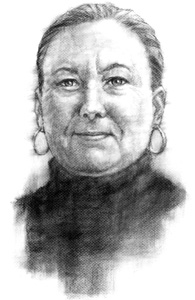Ann Lindsey’s passion for book conservation
Illustration by Allan Burch

Name: Ann Lindsey
Title: Director of Conservation, Regenstein Library
Degrees: AB (history), Georgia State University; SM (library science), certificate of advanced study in conservation, University of Texas
Previous posts: Huntington Library, San Marino, California; University of California, Berkeley
Why book conservation? People have asked me that before, and I say things like, “Oh, ever since I was a little girl….” But no. I grew up in Austin, Texas, and there is a program [at the University of Texas] for preservation and conservation. When I was an undergraduate, I knew people who were in the program. … Then years later I ended up back in Austin and thought, “I really liked that. I’m going to look into it.” I plucked up my courage and visited and totally fell in love. I said, “Whatever it takes for me to get into this program, I will do.”
Hands-on history: Working with your hands; the variety of materials—I love the history of technology. And [book conservation] is sort of a microcosm of the history of technology, of papermaking and ink and printing and pigments, cloths, dyes, and everything. It appeals to me because it is an art and a craft, and at the same time there’s a lot of science that goes into it, a lot of chemistry, and I can puzzle that out. It satisfies so many different elements that I find interesting.
Write of passage: It’s kind of a conservation joke that you know you’ve become a conservator when you get shocked when someone points out that there are words in a book.
Most unusual project: Two volumes of the works of Galileo printed just after his death. It was in terrible shape, and it required a lot of work. I had to disbind the book; I had to wash it. I had to make cords to sew it on, resew it. The absolute maximum that could be done to a book was done to this book, because it was in that bad shape. I totally rebound it—pared the leather, dyed the leather—the whole thing from start to finish.
I was just finishing up, and somebody had loaned me the documentary series on Galileo. And they explained how he looked at the stars and could tell that everything went around the sun and not the earth. We know that; we learned that in science classes. But it was the first time that I saw what they were talking about from looking at his own drawings, and seeing how he puzzled that out. It made sense to me for the first time ever. And then I went, “I have that on my desk at work.” I was able to find those pages and those drawings and look at them in a book I’d just rebound and say, “Wow.”
Why her, why here? Because I’ve seen so much planning and implementation [during a transition at the Huntington Library in California], I got to see what worked well and what didn’t, and I thought I could contribute [to the preservation department’s move from Regenstein to Mansueto in 2011]. And I love Chicago.
Mansueto’s gonna be sweet: We will, for one thing, have more space. We will have new equipment. Oh, we’ll have a sink—and not just a sink for washing up, because we don’t even have one of those. We’re going to have a specific paper-conservation sink: large, shallow. We’ll be able to wash materials and then have a space for a drying rack. We’re going to have increased security. We’re going to have a place to photo-document, to take before-and-after shots. … They’ve put a lot into planning the environment, and I think it’s going to be a really good environment for books, meaning the temperature and the humidity and the things in place if there are floods or fire.
The revolution will not be printed: The world is moving toward digital, and if we were solely relying on conservation of the object here at Chicago, I would say, yes, we are definitely swimming against the stream. But we have such a robust digitization project. There are times when you need to see the object regardless of whether it’s online and how detailed you can get. So I think we will always be an arm of the library system, in addition to reformatting, digitization. If it’s always a collaboration—what the scholars need, what the faculty needs—then it’s a good balance. I am not afraid of digital anything. In fact, somebody was asking me about the Kindle, “Would you ever get one?” and I thought, “Well, yeah, if it wasn’t $300, sure.”
Return to top